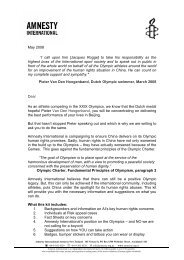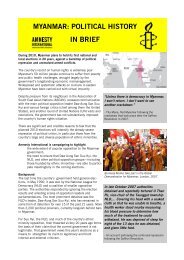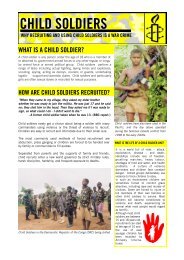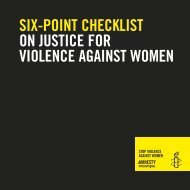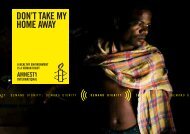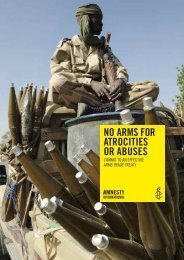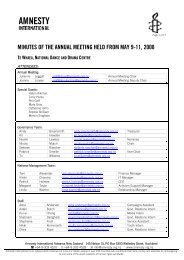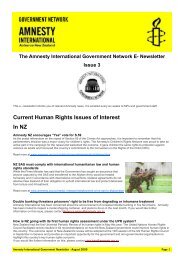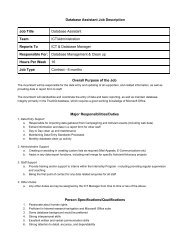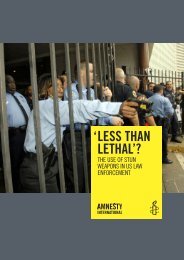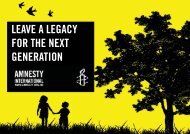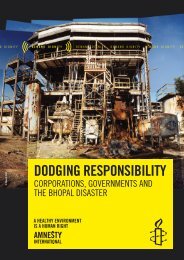DEMANDING DIGNITY: - Amnesty International
DEMANDING DIGNITY: - Amnesty International
DEMANDING DIGNITY: - Amnesty International
You also want an ePaper? Increase the reach of your titles
YUMPU automatically turns print PDFs into web optimized ePapers that Google loves.
<strong>DEMANDING</strong> <strong>DIGNITY</strong>:<br />
UNLOCKING PRISONERS OF POVERTY THROUGH JUSTICE<br />
Every minute a woman dies in childbirth because she can’t access adequate medical care. More than a billion<br />
people around the world live in insubstantial housing. Everyday, thousands of people die because they lack<br />
access to medicines, health workers, shelter, food and water, and a decent livelihood.<br />
These shocking statistics reflect how millions of people worldwide are locked into poverty. But poverty is more<br />
than just deprivation – for millions of people it is the daily denial of justice.<br />
<strong>Amnesty</strong> <strong>International</strong> Aotearoa New Zealand’s new global campaign, Demand Dignity, looks at the way that<br />
poverty and human rights violations often go hand in hand and drive each other in a continual negative cycle.<br />
Poverty is neither accidental nor inevitable. Poverty results from the decisions made by governments and other<br />
decision makers who hold the power to change people’s lives for the better. <strong>Amnesty</strong> believes that in working<br />
towards a solution to poverty, we must hold to account those that make the political decisions which violate<br />
human rights.<br />
Human rights belong to everyone, everywhere – and all human rights are equally important. Traditionally,<br />
<strong>Amnesty</strong> <strong>International</strong> has worked primarily in the areas of civil and political rights such as torture, the death<br />
penalty, and the right to fair trial. But there is also another and less discussed layer to human rights.<br />
Economic, social and cultural rights include the right to an adequate standard of living (including food,<br />
clothing, housing and healthcare), the right to education, and the right to work and to just and favourable<br />
conditions of work.<br />
These rights, along with civil and political rights, are all laid out in the Universal Declaration of Human Rights<br />
(UDHR) – the founding document for human rights that was adopted by all United Nation member states in<br />
1948. New Zealand was a key player in ensuring that economic, social and cultural rights were included in<br />
this important document.<br />
“What is the point of having the right to vote when you don’t have access to clean water, food or medication?<br />
Similarly, what’s the point of having access to health care when you don’t have freedom of expression or a fair<br />
trial,” explains <strong>Amnesty</strong>’s Pacific Researcher, Apolosi Bose.<br />
“Human rights allow us to develop our full potential as human beings. It’s about ensuring that our inherent<br />
dignity is respected,” he adds.<br />
By applying a rights-based approach to poverty, <strong>Amnesty</strong> <strong>International</strong> will work to ensure governments to<br />
commit to their legal and moral obligations to respect, protect, and fulfil ALL human rights for everyone.<br />
<strong>Amnesty</strong>’s history of campaigning for individuals will continue throughout the Demand Dignity Campaign,<br />
giving a human face to the consequences of governments failing to live up to the promises made in the<br />
adoption of the UDHR. In particular, <strong>Amnesty</strong> New Zealand will focus on securing the right to health<br />
(specifically maternal mortality) and the right to adequate housing.<br />
One example is the story of Rula Ashtiya, an Israeli woman who was forced to give birth on the road by a<br />
checkpoint, after Israeli soldiers refused her passage through the checkpoint to reach medical facilities.<br />
“At the checkpoint there were several soldiers, they were drinking coffee and ignored us. I was in pain and<br />
felt I was going to give birth there and then; I told my husband Daoud, who translated what I said to the<br />
soldiers but they did not let us pass. I was lying on the ground and I crawled behind a concrete block by the<br />
checkpoint to have some privacy and gave birth there in the dust, like an animal’.”<br />
<strong>Amnesty</strong> <strong>International</strong> Aotearoa New Zealand , Te Piringa, 68 Grafton Road, Grafton, P O Box 5300, Wellesley Street, Auckland 1010<br />
+64-9-303 4520 +64-9-303 4528 info@amnesty.org.nz www.amnesty.org.nz<br />
<strong>Amnesty</strong> <strong>International</strong> is an independent movement of more 2.2 million people in over 150 countries who contribute their time, money and<br />
expertise to campaigning to end some of the worst violations of human rights worldwide
Minutes later her newborn baby died in her arms.<br />
Pregnancy is not a disease, yet it kills one woman every minute. Almost all of these deaths are preventable<br />
and 95% of them occur in developing countries. <strong>Amnesty</strong>’s Maternal Mortality Project exposes the role that<br />
human rights violations play in maternal death and injury.<br />
As advocates and campaigners for human rights, <strong>Amnesty</strong> <strong>International</strong>’s Demand Dignity Campaign seeks to<br />
change the debate and perceptions around poverty, so that it is recognised as a grave human rights abuse<br />
caused by negligence and discrimination by governments and others in power.<br />
We aim to use the human rights framework as a key tool in ending poverty by ensuring that the provision of<br />
basic services such as healthcare and housing are seen as rights rather than privileges.<br />
To find out more about <strong>Amnesty</strong> <strong>International</strong>’s Demand Dignity Campaign, and how you can get involved,<br />
please visit www.amnesty.org.nz<br />
<strong>Amnesty</strong> <strong>International</strong> Aotearoa New Zealand , Te Piringa, 68 Grafton Road, Grafton, P O Box 5300, Wellesley Street, Auckland 1010<br />
+64-9-303 4520 +64-9-303 4528 info@amnesty.org.nz www.amnesty.org.nz<br />
<strong>Amnesty</strong> <strong>International</strong> is an independent movement of more 2.2 million people in over 150 countries who contribute their time, money and<br />
expertise to campaigning to end some of the worst violations of human rights worldwide



